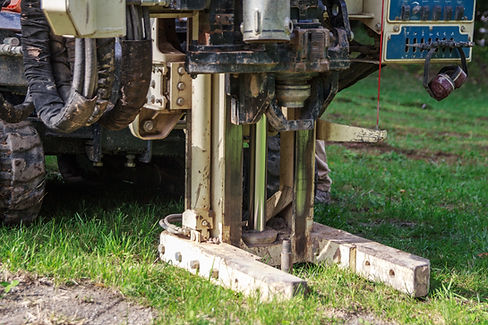
Permitting
Why Do I Need a Permit?
The Capital Area Groundwater Conservation District (CAGCD) has the authority to require permits and plans for the drilling or construction of water wells having a capacity in excess of 50,000 gallons per day, in accordance with R.S. 38:3076(A)(2) and 3076(E). The purpose of this Rule is to define the procedures to be used in applying for a permit.
Which Wells are Exempt?
Wells in the following categories are exempt from the requirement for permits:
-
Wells completed in the Mississippi River alluvial aquifer;
-
Wells completed at depths less than 400 feet;
-
Wells drilled for agricultural purposes; and
-
Wells not capable of producing 50,000 gallons per day.
Large-capacity wells in categories 1 and 3 above may be requested to supply plans and/or information that the board may reasonably require to accomplish its water management purposes.

What are the Requirements?
Permits are required for all nonexempt wells drilled in the parishes of Ascension, East Baton Rouge, East Feliciana, Pointe Coupee, West Baton Rouge, West Feliciana, and any other parishes that may be admitted to the Capital Area Groundwater Conservation District. The permit application for the proposed well shall be accompanied by a set of plans to include, at a minimum:
-
Location of proposed well to the nearest second of latitude and longitude;
-
Location of existing water wells within 1000 feet;
-
Proposed depth;
-
Casing and screen sizes and approximate depths;
-
Proposed well yield and average daily pumpage;
-
Piping layout geometry for the site;
-
A horizontal section of pipe for installation of the metering device and remote monitoring system shall be located downstream from the backflow preventer. The length and location of pipe shall be requested in the application and presented to the commission for approval; and
-
Site layout which includes a location of a six-foot by six-foot slab for installation of monitoring
equipment.
What is the Permitting Process?
As of November 20, 2023, permitting is a two-step process. Drilling or workover operations shall
not commence without a valid Permit to Drill or a Work Permit, respectively. New wells must have
a Permit to Operate prior to producing groundwater. Wells in operation prior to November 20,
2023, shall continue to operate.
At least 90 calendar days before beginning drilling or workover operations, the well owner (or his agent) who plans to drill or workover a nonexempt well shall submit a permit application to the District. A fee of $2,000 is required for new wells, recompletions into different strata and alteration of rates/volumes. A permit to drill or workover a well is valid for one year. Prior to expiration, an extension may be requested by sending an email to the address below.
To initiate the permitting process, well owners should complete the permit application form, available here. Completed forms should be submitted to:
Capital Area Groundwater Conservation District
3074 Westfork Drive, Suite A
Baton Rouge, LA 70816-2255
Telephone: (225) 293-7370
Email: CAGinfo@la.gov
A Permit to Operate is initiated by submittal of the DENR-GW-1 to the Louisiana Department of Energy and Natural Resources for a newly drilled or modified well. Well owners shall report work performed during a well workover to the District.
Important Notice
Please be advised that CAGCD permits do not exempt the permit holder from Louisiana Office of Conservation regulations on notification and registration.
Please visit www.dnr.la.gov/welldrillers for more information
Failure to Comply
Violation of this Rule may subject the owner or user to litigation.
In any such suit, the board may obtain injunctions, prohibitory and mandatory, including temporary restraining orders and preliminary injunctions as the facts warrant, as provided in R.S. 30:3077(C).
Recently Approved Permits
Title | Issue Date |
|---|---|
WBR Nat. Gas & Water Arena Well 2 | 03/15/2025 |
Baton Rouge Water Hurricane Ck. | 07/30/2024 |
2024-09 Baton Rouge Water Istrouma | 07/30/2024 |
Permit Letter ExxonEthos | 06/20/2024 |
Lion Copolymer Well 2 | 03/15/2024 |
Lion Copolymer Well 1 | 03/15/2024 |
Westlake Vinyls Well 1 | 03/15/2024 |
Lion Copolymer Well 3 | 03/15/2024 |
Westlake Vinyls Well 2 | 03/15/2024 |
Town of Slaughter Water System | 11/15/2023 |
Town of Slaughter | 11/15/2023 |
Parish Water Ramblin Oaks | 11/13/2023 |
Parish Water Company | 11/13/2023 |
Water Works District No. 1 of Pointe Coupee | 11/09/2023 |
Water Works District No.1 of Pointe Coupee Lakeland | 11/09/2023 |
Water Works District No.1 of Pointe Coupee | 09/29/2023 |
Water Works District No.1 of Pointe Coupee Ventress | 09/29/2023 |
City of Zachary | 09/29/2023 |
Water Works District No.1 of Pointe Coupee False River | 09/29/2023 |
Zachary NNW | 09/29/2023 |
Water Works District No.1 of Pointe Coupee | 09/29/2023 |
A permit to drill is only valid for 12 months from the date of issuance and is only for construction of a well which conforms to the details, plans, and specifications listed therein. An extension may be obtained upon approval.
